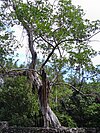Ficus aurea is a tree in the family Moraceae that is native to Florida, the northern and western Caribbean, southern Mexico and Central America south to Panama. The specific epithet aurea was coined by English botanist Thomas Nuttall who described the species in 1846; older names applied to this species have been ruled invalid. Ficus aurea is a strangler fig; seed germination usually takes place in the canopy of a host tree and the seedling lives as an epiphyte until its roots establish contact with the ground. It then enlarges and strangles its host, eventually becoming a freestanding tree in its own right. Individuals may reach 30 m (100 ft) in height. Like all figs, it has an obligate mutualism with fig wasps; figs are only pollinated by fig wasps, and fig wasps can only reproduce in fig flowers. The tree provides habitat, food and shelter for a host of tropical lifeforms including epiphytes in cloud forests and birds, mammals, reptiles and invertebrates. F. aurea is used in traditional medicine, for live fencing, as an ornamental and as a bonsai. (more...)
Recently featured: United States Senate election in California, 1950 – Acra – Tropical Storm Chantal
